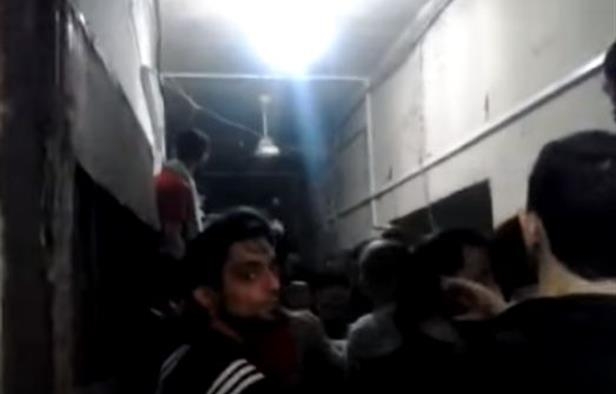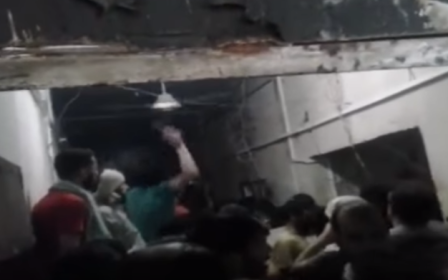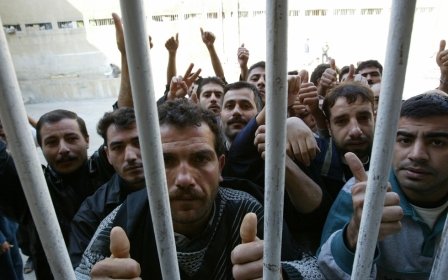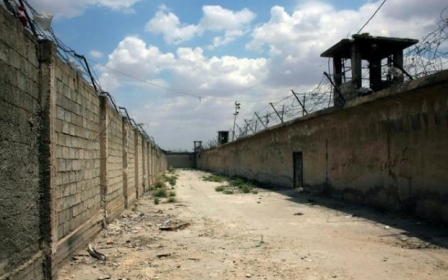Hama deal focuses attention on Syrian prisons ahead of talks

A tense week-long standoff between the Syrian government and 800 mostly political prisoners at Hama central prison is over - for now - following a potentially unprecedented agreement including prisoner releases, according to rights groups.
While activists warn that tensions are again rising in the prison, some hope that Hama could provide a much-needed rallying-point around the issue of political prisoners in upcoming Syrian peace talks.
Inmates at the civilian-administered Hama prison rioted on 1 May, allegedly in protest against the attempted transfer of five inmates to the notorious military-run Sednaya prison, where it is thought they were to be executed.
Inmates took control of several areas of the Hama prison, capturing a handful of officers in the process.
Many feared a security raid to retake control of the facility would result in mass casualties. However, a deal reportedly agreed upon by representatives of inmates and the Syrian interior justice ministries appeared to precipitate several unprecedented concessions from the government in return for a halt to unrest.
They included the restoration of water, power and food supplies to the inmates, as well as the release of all prisoners facing terrorism charges.
Hadeel al-Shalchi, a Syria researcher with Human Rights Watch (HRW) in Beirut, told Middle East Eye that the deal was relatively unchartered territory for Syria’s security apparatus.
“Since when has the government ever listened to the demands of prisoners - especially if they’re doing some sort of standoff?” Shalchi said, expressing surprise at how “compliant” the Syrian government had been during the course of negotiations.
“This is the first time we’ve really heard of this happening,” Shalchi added.
An interior ministry statement Monday, accompanied by a picture of Interior Minister Mohamed al-Shaar speaking to inmates, appeared to confirm the deal. This, after a ministry source had previously told state-run news agency SANA at the beginning of the standoff that there was “no truth” to reports of “chaos” inside the prison.
The ministry was unavailable for comment on the developments.
However, Syrian activists are now warning that the agreement is showing signs of collapse, amid rumours that the government is not releasing prisoners as promised - with conflicting figures from HRW and independent activists suggesting that anywhere between 20 and 50 Hama inmates may have been released. It was not possible to independently verify these claims.
At the same time, Hama’s inmates have refocused attention on the tens of thousands of political prisoners who have been "disappeared" or jailed since 2011, following weeks of headlines about government air strikes in Aleppo, rebel retaliations and the other grand narratives on Syria’s battlefield.
Indeed, the news comes as opposition negotiators prepare to push the prisoner issue to the forefront of Syrian talks set to begin in Geneva later this month.
65,000 arrested since uprising
Amnesty International, citing figures from the Syria Network for Human Rights (SNHR) monitoring group, last year stated that the Syrian government had forcibly disappeared and arrested at least 65,000 people - including 58,148 civilians - since the 2011 uprisings.
Amnesty argued that enforced disappearances, carried out by the Syrian government, its allies and several branches of the security apparatus, were “perpetrated as part of an organised attack against the civilian population that has been widespread, as well as systematic, and therefore amounts to crimes against humanity".
The number of civilians and pro-Assad fighters held by the opposition is unknown due to difficulties in obtaining accurate figures. There have meanwhile been several allegations of atrocities committed inside rebel-held prisons.
Prominent Syrian rights activist Mazen Darwish, the president of the Syrian Centre for Media and Freedom of Expression, was held in Syria for three years from September 2012, including several months at Hama.
Speaking to MEE from Brussels, Darwish said the Hama standoff was in part due “to the failure of the international community and UN, as well as the political process, to bring about any progress on the issue of detainees”.
“The continued use of arbitrary executions resulted in the explosion in the situation that we saw last week,” he said.
“But we don't want [Hama] to cover the whole detainees file itself,” Darwish said, arguing that so far there had been little discussion about prisoners in non-civilian facilities, including those held by pro-regime militias such as the Iran-trained National Defence Force (NDF) and Lebanese Hezbollah, or those inside an archipelago of infamous security branches spread across Damascus.
International awareness of Syria’s political prisoners has grown acutely since 2013 when "Caesar", a former forensic photographer for Syria’s military police, defected and leaked more than 50,000 photographs detailing alleged crimes against humanity perpetrated by security agencies around Damascus.
Prisoners ‘back to the forefront’?
Several high-level officials have identified the prisoner issue, and the possibility of mutual releases, as a key confidence-building measure in future negotiations - a way to “keep the momentum up”, in the words of one senior US official. In March, US Secretary of State John Kerry and Russian President Vladimir Putin identified the importance of the issue during meetings in Moscow.
Yet the Geneva political process and the opposition’s High Negotiations Committee (HNC) have failed to push the issue to the same level of importance at the negotiating table as humanitarian access to areas besieged by the government, or tentative and often transient ceasefires seen in different parts of the country.
After talks faltered in March, the UN special envoy for Syria, Staffan de Mistura, said: “There has been so far, as you know, the issue of humanitarian aid and the reduction of violence, but on the detainees’ aspect we have been having nothing in terms of outcome.”
On 21 April, he announced plans to appoint a senior expert to focus on the issue. Some are hoping this appointment will lead to progress when Geneva talks begin again later this month.
Some activists believe that this appointment, on top of recent unrest in Hama, could provide much-needed impetus.
Bassam al-Ahmad, a human rights activist and former spokesman for the Violations Documentation Centre (VDC) who was previously held in Syria’s Adra prison, cautiously welcomed the Hama agreement because of its potential effect on negotiations.
“When we [the opposition] have been talking about the detainees issue during negotiations, all of the speeches have been about, ‘It’s important, but let’s talk about the transitional body first. Let’s talk about the unity government first,’” he told MEE. “But now, the issue of prisoners - especially Hama - has come back to the forefront.”
At the same time, Ahmad managed expectations, suggesting the agreement may reflect a “smart step by the regime”.
“Look, this is the agreement,” he said. “Maybe the regime will do something different - there’s no guarantee of that - but they’ve agreed that they’ll return electricity and water, food, and they’ll release some people. This is good.”
He called for international observation of the agreement, from the UN or International Committee of the Red Cross, to ensure it held.
"We say in Arabic, ‘Let’s forget the past and talk about now and the future’. Maybe this is the message the regime would like to send to the international community.”
Eyes will be on Hama in coming days, as speculation grows about whether the Syrian government and Hama inmates will honour last week’s agreement.
HRW’s Shalchi said on Tuesday that “life had gone back to the normal” in the prison, although Darwish suggested that speculation about slow prisoner releases was fuelling concerns that an “escalation” may still be possible.
“Tensions are again on the rise,” he told MEE on Tuesday.
At the same time, Darwish warned, the issue of prisoners was “much bigger than Hama”.
“In Hama, you have about 800 political prisoners or prisoners of conscience. But we have tens of thousands of detainees [in Syria],” he said. “This is an issue that affects nearly every Syrian family.”
New MEE newsletter: Jerusalem Dispatch
Sign up to get the latest insights and analysis on Israel-Palestine, alongside Turkey Unpacked and other MEE newsletters
Middle East Eye delivers independent and unrivalled coverage and analysis of the Middle East, North Africa and beyond. To learn more about republishing this content and the associated fees, please fill out this form. More about MEE can be found here.




